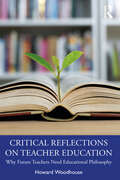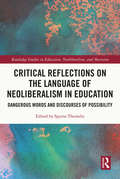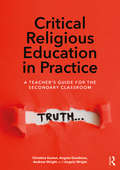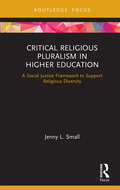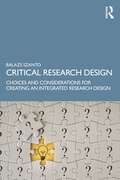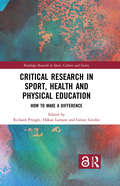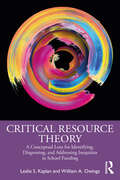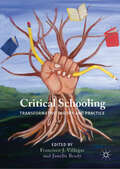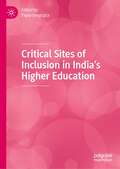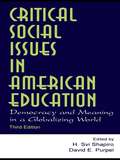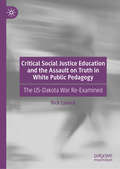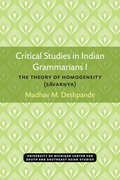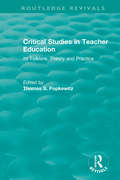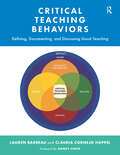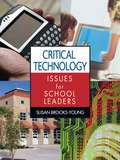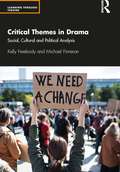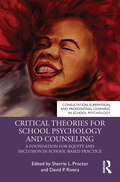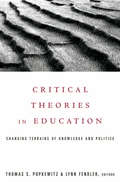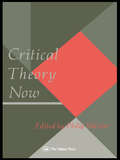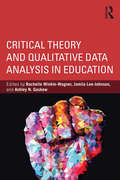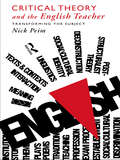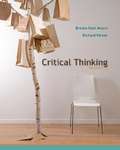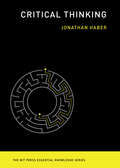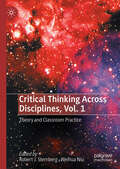- Table View
- List View
Critical Reflections on Teacher Education: Why Future Teachers Need Educational Philosophy
by Howard WoodhouseCritical Reflections on Teacher Education argues that educational philosophy can improve the quality of teacher education programs in Canada, the United States, and the United Kingdom. The book documents the ways in which the market model of education propagated by governments and outside agencies hastens the decline of philosophy of education and turns teachers into technicians in hierarchical school systems. A grounding in educational philosophy, however, enables future teachers to make informed and qualified judgements defining their professional lives. In a clear and accessible style, Howard Woodhouse uses a combination of reasoned argument and narrative to show that educational philosophy, together with Indigenous knowledge systems, forms the basis of a climate change education capable of educating future teachers and their students about the central issue of our time.
Critical Reflections on Teacher Education: Why Future Teachers Need Educational Philosophy
by Howard WoodhouseCritical Reflections on Teacher Education argues that educational philosophy can improve the quality of teacher education programs in Canada, the United States, and the United Kingdom. The book documents the ways in which the market model of education propagated by governments and outside agencies hastens the decline of philosophy of education and turns teachers into technicians in hierarchical school systems. A grounding in educational philosophy, however, enables future teachers to make informed and qualified judgements defining their professional lives. In a clear and accessible style, Howard Woodhouse uses a combination of reasoned argument and narrative to show that educational philosophy, together with Indigenous knowledge systems, forms the basis of a climate change education capable of educating future teachers and their students about the central issue of our time.
Critical Reflections on the Language of Neoliberalism in Education: Dangerous Words and Discourses of Possibility (Routledge Studies in Education, Neoliberalism, and Marxism)
by Spyros ThemelisRecognizing the dominance of neoliberal forces in education, this volume offers a range of critical essays which analyze the language used to underpin these dynamics. Combining essays from over 20 internationally renowned contributors, this text offers a critical examination of key terms which have become increasingly central to educational discourse. Each essay considers the etymological foundation of each term, the context in which they have evolved, and likewise their changed meaning. In doing so, these essays illustrate the transformative potential of language to express or challenge political, social, and economic ideologies. The text’s musings on the language of education and its implications for the current and future role of education in society make clear its relevance to today’s cultural and political landscape. This exploratory monograph will be of interest to doctoral students, researchers, and scholars with an interest in the philosophy of education, educational policy and politics, as well as the sociology of education and the impacts of neoliberalism.
Critical Religious Education in Practice: A Teacher's Guide for the Secondary Classroom
by Angela Wright Andrew Wright Christina Easton Angela GoodmanCritical Religious Education in Practice serves as an accessible handbook to help teachers put Critical Religious Education (CRE) into practice. The book offers straightforward guidance, unpicking some of the key difficulties that teachers encounter when implementing this high-profile pedagogical approach. In-depth explanations of CRE pedagogy, accompanied by detailed lesson plans and activities, will give teachers the confidence they need to inspire debate in the classroom, tackling issues as controversial as the authority of the Qur’an and the relationship between science and religion. The lesson plans and schemes of work exemplify CRE in practice and are aimed at empowering teachers to implement CRE pedagogy across their curriculum. Additional chapters cover essential issues such as differentiation, assessment, the importance of subject knowledge and tips for tackling tricky topics. The accompanying resources, including PowerPoint presentations and worksheets, are available via the book’s companion website. Key to developing a positive classroom culture and promoting constructive attitudes towards Religious Education, this text is essential reading for all practising and future teachers of Religious Education in secondary schools.
Critical Religious Pluralism in Higher Education: A Social Justice Framework to Support Religious Diversity (Routledge Research in Higher Education)
by Jenny L. SmallThis text presents a new critical theory addressing religious diversity, Christian religious privilege, and Christian hegemony in the United States. It meets a growing and urgent need in our society—the need to bring together religiously diverse ways of thinking and being in the world, and eventually to transform our society through intentional pluralism. The primary goal of Critical Religious Pluralism Theory (CRPT) is to acknowledge the central roles of religious privilege, oppression, hegemony, and marginalization in maintaining inequality between Christians and non-Christians (including the nonreligious) in the United States. Following analysis of current literature on religious, secular, and spiritual identities within higher education, and in-depth discussion of critical theories on other identity elements, the text presents seven tenets of CRPT alongside seven practical guidelines for utilizing the theory to combat the very inequalities it exposes. For the first time, a critical theory will address directly the social impacts of religious diversity and its inherent benefits and complications in the United States. Critical Religious Pluralism in Higher Education will appeal to scholars, researchers, and graduate students in higher education, as well as critical theorists from other disciplines.
Critical Research Design: Choices and Considerations for Creating an Integrated Research Design
by Balazs SzantoThis student friendly book demonstrates how to take a critical approach to the research design process, to create feasible, original, and critical research works.The author uses a unique model that incorporates three critical review cycles: methodological design, epistemology, and completed research plan, in order to ensure that readers have critically engaged with various components of the research proposal. Approaching research design as a coherent whole, this book focuses on critically understanding how the various components come together as a cohesive and interconnected design, as well as to explore how the same basic research idea can lead to a number of different research designs. Including sections on both conceptual and methodological designs, readers are equipped with the skills and knowledge needed to take a basic research idea and conceptualize a complete and organic design for a research based on it that can make an original contribution to the existing body of knowledge.Covering quantitative, qualitative, and mixed methods approaches, and addressing the ethical implications of research, this is an essential resource for researchers, instructors, and students across a broad range of disciplines in the social and behavioral sciences and humanities.
Critical Research in Sport, Health and Physical Education: How to Make a Difference (Routledge Research in Sport, Culture and Society)
by Göran Gerdin Richard Pringle Håkan LarssonWithin the overlapping fields of the sociology of sport, physical education and health education, the use of critical theories and the critical research paradigm has grown in scope. Yet what social impact has this research had? This book considers the capacity of critical research and associated social theory to play an active role in challenging social injustices or at least in ‘making a difference’ within health and physical education (HPE) and sporting contexts. It also examines how the use of different social theories impacts sport policies, national curricula and health promotion activities, as well as the practices of HPE teaching and sport training and competition. Critical Research in Sport, Health and Physical Education is a valuable resource for academics and students working in the fields of research methods, sociology of sport, physical education and health. Chapter 5 of this book is freely available as a downloadable Open Access PDF at http://www.taylorfrancis.com under a Creative Commons Attribution-Non Commercial-No Derivatives (CC-BY-NC-ND) 4.0 license.
Critical Resource Theory: A Conceptual Lens for Identifying, Diagnosing, and Addressing Inequities in School Funding
by Leslie S. Kaplan William A. OwingsCritical Resource Theory (CReT) offers an innovative critical perspective on education funding. This new conceptual lens enables school leaders and policy makers to analyze quantitatively school funding policies and practices as a catalyst to make them more equitable. It offers a useful orientation and tool to increase fairness and opportunity in a society that systemically advantages the dominant group with ample resources while it disadvantages others by withholding them. Presenting a balance between the theoretical and its practical application to improve educational outcomes for marginalized children, chapters introduce and discuss this new extension of Critical Theory, validate it as a value-added and complete theory, place it within a broader philosophical framework, and construct its historical, social, political, and educational contexts. Designed for use in school finance and educational policy courses, this book presents an analytical tool that leaders, scholars, and policy makers can use to alter how they view public funding policies and practices – to question their assumptions about funding and resource allocations, look for, identify, and assess inadequacies and inequities, share their findings, and use these data to shape policy recommendations for increased fiscal fairness and improved student outcomes.
Critical Schooling: Transformative Theory And Practice
by Francisco J. Villegas Janelle BradyThis edited volume brings to the foreground the inequities of contemporary schooling in Canada. The editors and authors perform a critical examination of the Canadian schooling space, highlighting the agency and action of marginalized communities and their efforts to address injustice within contexts of schooling. Grounded in the unique perspective of each author, this book provides a venue for transformative practice to create inclusive and socially just contexts for diverse populations, specifically as experienced by peoples who inhabit the intersections of various modes of oppression.
Critical Sites of Inclusion in India’s Higher Education
by Papia SenguptaThis book acquaints the reader to the often invisible-ized practices and policies under the rhetoric of ‘inclusion’, through theoretical and empirical analysis. It emphasizes on the complexities of education policies in a multicultural state by identifying the challenges to the idea of ‘inclusion’ illuminated through judicial interventions, policy-frameworks and everyday experiences of individuals. Higher education is imperative to empowerment in socially stratified societies marred with deep inequalities like India and many other multicultural countries. Disputes over inclusion remains a critical feature in Indian higher education sector, as it is viewed as facilitating access to economic opportunities and providing vertical mobility for individuals belonging to marginalized communities. Higher education empowers, and expands individual horizons of thought and ideas of freedom, dignity, equality, enabling individuals to participate actively in the political-sociological discourses in democratic polity. Therefore, policy makers, political theorists and educationists have been examining the question of inclusion and education as public-good. Contemporary India has witnessed an unprecedented attack on academic freedom, free exchange of ideas and expressions, challenging the very idea of inclusion and inclusiveness.
Critical Social Issues in American Education: Democracy and Meaning in a Globalizing World
by H. Svi Shapiro David E. PurpelThis text-reader brings together powerful readings that critically situate issues of education in the context of the major cultural, moral, political, economic, ecological, and spiritual crises that confront us as a nation and a global community. It provides a focus and a conceptual framework for thinking about education in light of these issues. Readers are exposed to the thinking of some of the best and most insightful social and educational commentators. Critical Social Issues in American Education: Democracy and Meaning in a Globalizing World, Third Edition, is intended to work on two levels. First, it helps readers to develop an awareness of how education is connected to the wider social structures of cultural, political, and economic life. Second, it encourages not only a critical examination of our present social reality but also a serious discussion of alternatives--of what a transformed society and educational process might look like. The editors' goal is to deliberately engage readers in connecting the work of teachers to an ethically committed, politically charged pedagogy. The assumption on which they base the text is that educators must see their work as inextricably linked to the broader conflicts, stresses, and crises of the social world--it is not otherwise possible to make sense of what is happening educationally. What happens in school, or as part of the educational experience, reflects, expresses, and mediates profound questions about the direction and nature of the society we inhabit. The text is organized thematically into five sections, which address, respectively, social justice and democracy; consumerism, culture, and public education; marginality and difference; moral and spiritual perspectives on education; and globalization and education. Each section is preceded by a brief essay that introduces the readings. This Third Edition includes many new readings and addresses issues that have more recently emerged as especially significant--such as concerns about the implications of globalization and the post 9/11 world, commercialism, violence, and the ever-increasing influence of high stakes testing. This compelling text is relevant for a wide range of courses in educational foundations, educational policy, curriculum studies, and multicultural education that address the social context of education, cultural and political change, and public policy.
Critical Social Justice Education and the Assault on Truth in White Public Pedagogy: The US-Dakota War Re-Examined
by Rick LybeckThis book explores tensions between critical social justice and what the author terms white justice as fairness in public commemoration of Minnesota’s US-Dakota War of 1862. First, the book examines a regional white public pedagogy demanding “objectivity” and “balance” in teaching-and-learning activities with the purpose of promoting fairness toward white settlers and the extermination campaign they once carried out against Dakota people. The book then explores the dilemmas this public pedagogy created for a group of majority-white college students co-authoring a traveling museum exhibit on the war during its 2012 sesquicentennial. Through close analyses of interviews, field notes, and course artifacts, this volume unpacks the racial politics that drive white justice as fairness, revealing a myriad of ways this common sense of justice resists critical social justice education, foremost by teaching citizens to suspend moral judgment toward symbolic white ancestors and their role in a history of genocide.
Critical Studies in Indian Grammarians I: The Theory of Homogeneity (SĀVARṆYA) (Michigan Series In South And Southeast Asian Languages And Linguistics)
by Madhav M. DeshpandeIn the historical study of the Indian grammarian tradition, a line of demarcation can often be drawn between the conformity of a system with the well-known grammar of Pāṇini and the explanatory effectiveness of that system. One element of Pāṇini’s grammar that scholars have sometimes struggled to bring across this line of demarcation is the theory of homogeneity, or savarṇa, which concerns the final consonants in Pāṇini’s reference catalog, as well as phonetic similarities between sounds. While modern Sanskrit scholars understand how to interpret and apply Pāṇini’s homogeneity, they still find it necessary to unravel the history of varying interpretations of the theory in subsequent grammars. Madhav Deshpande’s The Theory of Homogeneity provides a thorough account of the historical development of the theory. Proceeding first to study this conception in the Pāṇinian tradition, Deshpande then passes on to other grammatical systems. Deshpande gives attention not only to the definitions of homogeneity in these systems but also the implementation of the theory in those respective systems. Even where definitions are identical, the concept may be applied quite differently, in which cases Deshpande examines by considering the historical relationships among the various systems.
Critical Studies in Teacher Education: Its Folklore, Theory and Practice (Routledge Revivals)
by Thomas S. PopkewitzOriginally published in 1987, this was the only available book to offer a critical interpretation of the current reform efforts in teacher education at the time. The focus is issues of professionalization, the role of the university and schools in the socialization of teachers, and the ideological and social assumptions that underlie educational theory. The book draws upon the sociology of knowledge, Marxist theory and political sociology.
Critical Teaching Behaviors: Defining, Documenting, and Discussing Good Teaching
by Lauren Barbeau Claudia Cornejo HappelWhat does “good” teaching mean, and how can we know it when we see it? Perhaps you have grappled with these questions at some point in your career, either as an instructor wanting to document or grow your teaching effectiveness or as a peer or administrator trying to provide guidance to or assess the teaching of others.This book serves three purposes: a condensed, evidence-based guide to effective teaching; a resource on creating a focused teaching narrative and teaching portfolio; and a toolkit that equips faculty to conduct peer observations, student midterm feedback, and productive conversations related to teaching.The first part of the book offers a rich guide as to what constitutes effective teaching based on a comprehensive review of the research on instructional strategies and behaviors that promote student engagement, learning, and success. It includes practical advice flexible enough to accommodate disciplinary and contextual differences, recognizing that readers will want to adapt effective behaviors based on their values and dispositions.The opening chapters successively cover aligning classroom activities to learning goals; teaching inclusively to account for students’ prior learning and diversity; creating an environment that promotes students’ active engagement in learning and taking responsibility for their intellectual development; assessing students’ progress and adjusting teaching accordingly; using technology effectively; and finally engaging in reflective self-assessment with feedback from peers and students to adjust and develop teaching skills.In the second part of the book, the authors offer structured guidance on developing a focused teaching narrative, gathering peer and student feedback to support that narrative, and curating a portfolio to showcase exemplary practices and achievements. The insights and tools presented also equip readers to facilitate classroom peer observations and gather midterm student feedback. Overall, the second part of the book provides readers with a common language and tools to use when discussing teaching with peers and those who may formally or informally observe their teaching. The book builds to providing the reader with a clear sense of the criteria and evidence needed to document their teaching for the purposes of annual review, promotion, or tenure.The now widely recognized Critical Teaching Behaviors (CTB) framework offers a holistic means of documenting and assessing teaching effectiveness by including a variety of evidence and perspectives. The comprehensive feedback and documentation toolkit aligned to the framework incorporates more of the instructor’s perspective on their own teaching into the evaluation process and substitutes for or supplements student evaluations of teaching (SETs). Administrators will also find the CTB useful as a template and guide for the objective evaluation of teaching.In a single volume, this book offers faculty evidence-based guidance and encouragement to explore effective teaching strategies whether they are just embarking on their college teaching journey or are experienced instructors looking to explore new ideas. The CTB presents instructors a roadmap to both developing teaching skills and demonstrating achievements in promoting student learning to advance their careers. It is designed to be an interactive workbook. While readers can choose to read passively, they will get the most value from this book by completing the prompts and activities along the way.
Critical Technology Issues for School Leaders
by Dr Susan J. Brooks-YoungThis resource helps school leaders focus on critical technology leadership issues and practical solutions for integrating technology into any school, administration, or professional development program.
Critical Themes in Drama: Social, Cultural and Political Analysis (Learning Through Theatre)
by Kelly Freebody Michael FinneranCritical Themes in Drama is concerned with the relationship between drama and the current socio-political context. It builds on and contributes to ongoing scholarly conversations regarding the use, benefit, challenges and opportunities for drama and theatre as a social, cultural, educational and political act. The intention of this book is to canvas current theory and practice in drama, to provide an extended examination of how drama as a pro-social practice intersects with socio-cultural institutions, to link critical discourse and examine ways drama may contribute to a broader social justice agenda. Authors draw on a variety of theoretical tools from the fields of sociology, anthropology and cultural studies. This combines with an exploration of work from drama practitioners across a variety of countries and practices to provide a map of how the field is shaped and how we might understand drama praxis as a social, cultural and political force for change. This book offers drama scholars, practitioners, researchers and teachers a critical exploration which is both hopeful and critical; acknowledging the complexities and potential pitfalls, while celebrating the opportunities for drama as a practice for social action and positive change.
Critical Theories for School Psychology and Counseling: A Foundation for Equity and Inclusion in School-Based Practice (Consultation, Supervision, and Professional Learning in School Psychology Series)
by Sherrie L. Proctor David P. RiveraCritical Theories for School Psychology and Counseling introduces school psychologists and counselors to five critical theories that inform more equitable, inclusive work with marginalized and underserved student populations. Offering accessible conceptualizations of each theory and explicit links to application in practice and supervision, the book speaks to common professional functions and issues such as cognitive assessment, school-based counseling, discipline disproportionality, and more. This innovative collection offers graduate students, university faculty, and practicum and internship supervisors an insightful new direction for serving learners across diverse identities, cultures, and abilities.
Critical Theories in Education: Changing Terrains of Knowledge and Politics (Social Theory, Education, And Cultural Change Ser.)
by Lynn Fendler Thomas S PopkewitzThis book examines critical theories in education research from various points of view in order to critique the relations of power and knowledge in education and schooling practices. It addresses social injustices in the field of education, while at the same time questioning traditional standards of critical theory. Drawing on recent social and lit
Critical Theory Now
by Philip WexlerFirst Published in 1991. Routledge is an imprint of Taylor & Francis, an informa company.
Critical Theory and Qualitative Data Analysis in Education
by Rachelle Winkle-Wagner Jamila Lee-Johnson Ashley N. GaskewCritical Theory and Qualitative Data Analysis in Education offers a path-breaking explanation of how critical theories can be used within the analysis of qualitative data to inform research processes, such as data collection, analysis, and interpretation. This contributed volume offers examples of qualitative data analysis techniques and exemplars of empirical studies that employ critical theory concepts in data analysis. By creating a clear and accessible bridge between data analysis and critical social theories, this book helps scholars and researchers effectively translate their research designs and findings to multiple audiences for more equitable outcomes and disruption of historical and contemporary inequality.
Critical Theory and The English Teacher: Transforming the Subject (Teaching Secondary English Series)
by Nick PeimIn this radical exploration, Nick Peim, himself a practising English teacher, shows how teachers can use critical theory to bring students' own experience back into the subject. The author explains how the insights of discourse theory, psychoanalysis, semiotics and deconstruction can be used on the material of modern culture as well as on and in oral work. The book is written in a style which even those with no background in critical theory will find approachable, and arguments are backed up with practical classroom examples.
Critical Thinking (9th edition)
by Richard Parker Brooke Noel MooreMore than any other textbook, Moore and Parker's Critical Thinking has defined the structure and content of the critical thinking course at colleges and universities across the country--and has done so with a witty writing style that students enjoy. Current examples relevant to today's students bring the concepts of critical thinking to life in vivid detail. This ninth edition offers an abundance of new exercises and examples, as well as a renewed focus on the importance of developing critical thinking skills.
Critical Thinking (The MIT Press Essential Knowledge Series)
by Jonathan HaberHow the concept of critical thinking emerged, how it has been defined, and how critical thinking skills can be taught. Critical thinking is regularly cited as an essential twenty-first century skill, the key to success in school and work. Given our propensity to believe fake news, draw incorrect conclusions, and make decisions based on emotion rather than reason, it might even be said that critical thinking is vital to the survival of a democratic society. But what, exactly, is critical thinking? In this volume in the MIT Press Essential Knowledge series, Jonathan Haber explains how the concept of critical thinking emerged, how it has been defined, and how critical thinking skills can be taught and assessed.Haber describes the term's origins in such disciplines as philosophy, psychology, and science. He examines the components of critical thinking, including structured thinking, language skills, background knowledge, and information literacy, along with such necessary intellectual traits as intellectual humility, empathy, and open-mindedness. He discusses how research has defined critical thinking, how elements of critical thinking have been taught for centuries, and how educators can teach critical thinking skills now.Haber argues that the most important critical thinking issue today is that not enough people are doing enough of it. Fortunately, critical thinking can be taught, practiced, and evaluated. This book offers a guide for teachers, students, and aspiring critical thinkers everywhere, including advice for educational leaders and policy makers on how to make the teaching and learning of critical thinking an educational priority and practical reality.
Critical Thinking Across Disciplines, Vol. 1: Theory and Classroom Practice
by Robert J. Sternberg Weihua NiuThis edited collection adopts a multidisciplinary perspective on critical thinking, bringing together leading experts from fields such as psychology, philosophy, education, and creativity studies. It explores both the theoretical foundations and practical applications of critical thinking in the classroom. By integrating diverse approaches, the book aims to foster a richer dialogue and deeper understanding of critical thinking, while enhancing its application to address emerging challenges in the first quarter of the 21st century, including global pandemics, geopolitical tensions, and the rise of generative AI. Volume 1 offers a comprehensive survey of cutting-edge multidisciplinary research, laying the groundwork for Volume 2, which will delve into the application of critical thinking to contemporary issues such as artificial intelligence, misinformation, and health communication.
